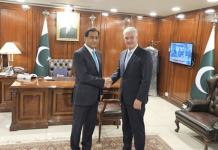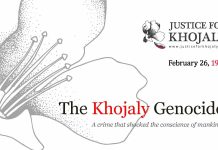ISLAMABAD: The Centre for Afghanistan, Middle East & Africa (CAMEA) at the Institute of Strategic Studies (ISSI) held a webinar on “Evolving Situation in Afghanistan ” on August 26, 2021. The distinguished speakers included: Dr. Abdullah Anas , author of ‘To the Mountains: My Life in Jihad, from Algeria to Afghanistan’, Mr. Tamim Asey, Founder & Executive Chairman of the Institute of War and Peace Studies (IWPS), Kabul, Mr. Adam N Weinstein, Research Fellow at the Quincy Institute, Ms. Amina Khan, Director CAMEA, ISSI. Ambassador Aizaz Ahmad Chaudhry, Director General ISSI, Dr. Daud Abdullah, Director Middle East Monitor (MEMO), and Ambassador Khalid Mahmood, Chairman BOG, ISSI also spoke on the occasion.
During his introductory remarks, Dr. Daud Abdullah stated that the presence of foreign troops in Afghanistan was always seen as an affront to what it means to be an Afghan. The reaction which we saw as a result of the invasion was predictable for a country that was never colonised. There had long been a recognition that the war in Afghanistan was unwinnable. Even after the Afghan army mobilized a force, they were unable to reverse the trend of defeat and the invading forces could not motivate young Afghans to fight against their fellow Afghans. He also added that after what he called a ‘misadventure’, the inquisition, export and imposition of western values remains a fantasy. Afghanistan represents a classic case in this regard, he stated.
During his welcome remarks, Ambassador Aizaz Ahmad Chaudhry said that the end of any occupation is an inevitable reality and should be endorsed. He believed that the Taliban could achieve political stability in Afghanistan, provided they form an inclusive setup and honour their commitments and adopt a more moderate outlook. Moreover, the Taliban should honour their promise that Afghan soil will not be used against any other country- something which all of Afghanistan’s neighbours are very sensitive about. He said that the Ashraf Ghani government was dependent on economic assistance from the West, but now the Taliban should not expect any economic assistance from the West. Hence, the Taliban should instead count on trade and transit trade for economic development, especially through Pakistan and Iran.
Dr Abdullah Anas said that though I am Algerian and I live in the UK, my heart remains in Afghanistan. Happiness through military victory is not permanent; the real victory will be a political victory. He said that before we go to the topic of international recognition of the Taliban, we have to solve the issue of a political solution inside Afghanistan. History is a witness that the politics of exclusion and intolerance did not last long. The Taliban need to learn from this and be compelled to shape the future political system of Afghanistan. He added that there needs to be reconciliation between all Afghan factions for enduring peace and stability. Pakistan is like the ‘big brother’ of Afghanistan, which automatically means it has the responsibility of facilitating the establishment of an inclusive political system in Afghanistan. One system, one idea and one faction cannot rule Afghanistan, he concluded.
Dr. Tamim Asey said no single group can rule Afghanistan and any power grab will not survive in Afghanistan. He stated that wars are a costly business and the resources to facilitate war in Afghanistan should be questioned. It is too early to say that the Taliban takeover is a military victory since fighting is still ongoing. He advised the Taliban to accept the diversity of Afghanistan. The way to win peace is to form an inclusive, broad based government. At the moment the smartest policy for the Taliban to secure international support is to first announce their vision, form an inclusive government and not to pursue security trade offs. If these are not done within the next six months, fighting will re-emerge and Afghanistan will plunge into another civil war. There also needs to be a reset of relations with Pakistan and the Taliban should also rethink their relation with the West. The key is to win peace now, he concluded.
Dr. Adam Weinstein said that Afghanistan has always been beholden to what outside powers want for it. The ideal situation would have been the formation of an inclusive set up in Afghanistan and there was some form of transition instead of the present uncertainty. The previous government in Kabul was mired in strategic incompetence and pursued their own short sighted political gains; as a result, Afghans suffered. He also said if something is not done soon, there will be casualties in Afghanistan due to starvation. It also needs to be ensured that there needs to be the creation of a system where a political equilibrium emerges. Afghanistan is not a country that can be sustained through cross border trade since it is a country which has been heavily dependent on aid. He also added that the recent ‘Sanction Pakistan’ movement is a laughable proposition because it does not solve any US problem related to Afghanistan. Here he added that though Pakistan does not have complete leverage over the Taliban, it is in Islamabad’s interest to work with the Taliban government and form an inclusive government.
Ms. Amina Khan stated that there is no doubt that with the announcement of the US withdrawal, in the absence of a negotiated settlement, a military takeover by the Taliban was expected, the manner, and the speed at which the group has taken over, along with the tactics employed was certainly not anticipated. While many were foreseeing bloodshed, unlike the past, the Taliban have so far adopted non offensive tactics, and thus by far the transition process has been relatively smooth. The Taliban have assured that they will not resort to any sort of violence in fear that they will lose the support and recognition the group so badly needs from the international community to legitimize their rule even if it is within the context of an inclusive set up. The Taliban have been holding meetings with major Afghan stakeholders and while there are some signs of resistance, it appears that key Afghan stakeholders / factions are willing to work with the Taliban in this inclusive political set up we keep on hearing about. She concluded by stating that Afghanistan must be viewed as a collective and shared responsibility – which entailed ensuring the formation of an inclusive political setup that is acceptable to all.
In his conclusion remarks, Ambassador Khalid Mahmood stated that the Afghan war ended with a great human and economic loss and one thing which is certain is that Afghanistan is a graveyard of empires. He did not think the US has completely withdrawn from the region and remains a pre-eminent power. Sensitivity needs to be shown to the local culture and multilateralism needs to be reinforced. To have credibility there need to be no double standards, he said. The Taliban should be aware that international legitimacy needs to be earned.











